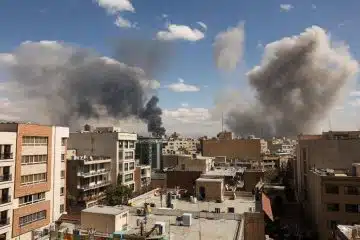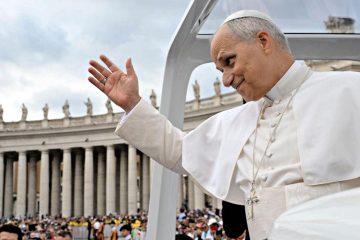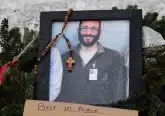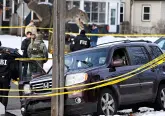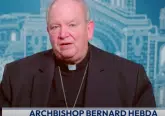Minnesota school shooting came after bishops’ pleas for security went unanswered
National Catholic Register, Aug 28, 2025 / 06:00 am
After a pair of out-of-state school shootings in 2022 and 2023 shocked the nation, Minnesota’s bishops implored state lawmakers to provide security funding for local nonpublic schools.
Now, two years after their appeals went unheeded, tragedy has struck one of their own.
On the morning of Aug. 27, a gunman opened fire during an all-school Mass at Annunciation Catholic Church in Minneapolis, killing two students, aged 10 and 8; 14 other students and three adults were injured.
The tragedy comes after the Minnesota Catholic Conference (MCC), the public policy voice of Minnesota’s six dioceses, made requests to state officials to extend funds for security upgrades and emergency-response training to nonpublic schools in both 2022 and 2023.
The appeals, which came after deadly school shootings at Robb Elementary School in Uvalde, Texas, and at the Covenant School in Nashville, Tennessee, argued that students at Catholic and other nonpublic schools should receive the same level of protection as their public-school peers.
“We need to ensure that all our schools have the resources to respond to and prevent these attacks from happening to our schools,” wrote Jason Adkins, MCC’s executive director, in an April 14, 2023, letter to Gov. Tim Walz and Lt. Gov. Peggy Flanagan, who are both Democrats. The letter was also signed by Tim Benz, president of a Minnesota independent school organization.
If MCC’s request had been granted, Catholic schools like Annunciation would have been able to use state funds for enhancements like secure entries to facilities or even to hire school resource officers.
But the Minnesota bishops’ appeals were rebuffed in both years, as related bills stalled in the state Legislature, resulting in no additional funding for nonpublic school security. Meanwhile, for the 2023 legislative session, Minnesota enjoyed a historic $17.6 billion surplus.
In the aftermath of the Annunciation school shooting, the issue will assuredly be revisited — including why lawmakers failed to act on the bishops’ request.
Responding to a request for comment, Walz’s office underscored that the governor “cares deeply about the safety of students” and has “signed into law millions in funding for school safety.” The National Catholic Register, CNA’s sister news partner, confirmed, however, that none of the previously signed funding bills applied to nonpublic school safety.
“We remain committed to working with anyone who is willing to work with us to stop gun violence and keep our students safe,” said the spokesman, noting that Walz meets with MCC on a regular basis.
Meanwhile, Republican state Sen. Julia Coleman, R-Waconia, told the Register that the tragedy is prompting her to reflect on her “responsibility as an elected official.”
“There are no easy answers, but I know our children — our most precious assets — must be protected,” said Coleman, a Catholic. “Now is the time to make school security funding a priority.”
In his first public remarks following the shooting, Archbishop Bernard Hebda of St. Paul and Minneapolis begged for prayers for those affected. He also called for an end to gun violence.
“Our community is rightfully outraged at such horrific acts of violence perpetrated against the vulnerable and innocent,” he wrote in a statement. “They are far too commonplace.”
Adkins declined to comment at this time.
Previous requests
The Minnesota bishops’ efforts to secure school security funding came after state lawmakers had passed “Safe Schools” legislation in 2019 that provided money for security enhancements to public schools but not to nonpublic ones.
In 2022, after a bill to expand the funding to nonpublic schools stalled, Minnesota’s bishops urged Walz to call a special session and pass an expansion to Safe Schools. The measure would have provided $44 per student for security costs, regardless of their school’s affiliation.
“Although no legislation can stop the manifestation of evil, this Safe Schools legislation is an important, commonsense first step to establishing an ongoing funding source for schools to increase security staff, enhance building security, and strengthen violence prevention programs and mental health initiatives,” Hebda wrote in a May 2022 letter.
The House version of the bill was supported by multiple members of the Democrat-Farmer-Labor Party, the Minnesota affiliate of the national Democratic Party, indicating bipartisan support. However, Walz did not call a special session to pass the legislation.
The following year, MCC implored Minnesota’s lawmakers to make nonpublic schools eligible recipients of a $50 million security grant program included in the state’s education finance bill.
The 2023 letter cosigned by MCC described “the exclusion of one sector of schools” from security funding as “a discriminatory act against our students.”
An attack on any school, whether it is a public, nonpublic, charter or another school site, cannot be tolerated or allowed to happen in Minnesota,” the letter writers said.
Meeting, but no funding
According to comments Adkins made to The Daily Wire, Minnesota’s bishops had raised their concerns with Walz, a former public school teacher, in a meeting.
“He communicated his belief that people should feel safe in their schools and places of worship,” Adkins said. “But the appropriation was not created.”
As governor, Walz exerts significant influence over the budget process, including by proposing the initial biennial budget legislators are tasked to work with.
The Daily Wire article suggested that Walz focused on other priorities that year, such as securing Minnesota’s status as a “trans sanctuary” state.
MCC’s support for nonpublic school security in 2022 and 2023 is part of a more comprehensive effort to reduce gun violence. The bishops have also supported “red flag” orders, which temporarily restrict firearm access to individuals who pose a risk to themselves or others, and expanded background checks.
The Minnesota bishops did not take a public stance on security funding for Catholic schools in 2024 or 2025. Instead, MCC’s Catholic school-related efforts in those years included opposing the exclusion of religious colleges from postsecondary enrollment programs and securing religious exemptions from new legislation that included “gender identity” as a protected class under state law.
This story was first published by the National Catholic Register, CNA’s sister news partner, and has been adapted by CNA.



